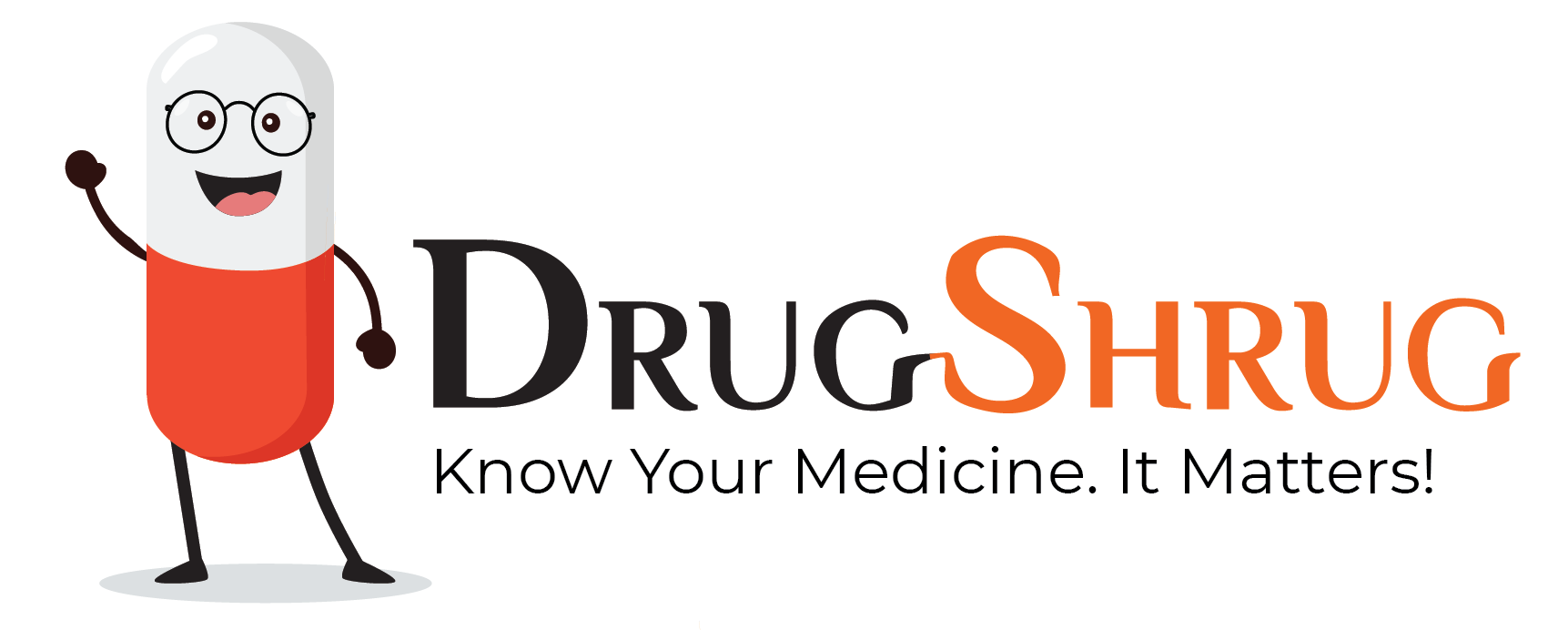What is Warfarin?
Warfarin is an anticoagulant drug aka blood thinner. It lowers the formation of blood clots. This medicine is recommended to treat or avoid blood clots in arteries and veins, which further decreases the risk of getting heart attacks, strokes, or other related conditions that are serious. This drug may also be used for purposes not mentioned here in this precise medication guide.
What are the common conditions in which Warfarin prescribed?
This medicine is used to cure or prevent blood clot formation in the blood vessels, which consequently lowers the risk of heart attack and strokes. It is also employed as an anticoagulant in various other related conditions.
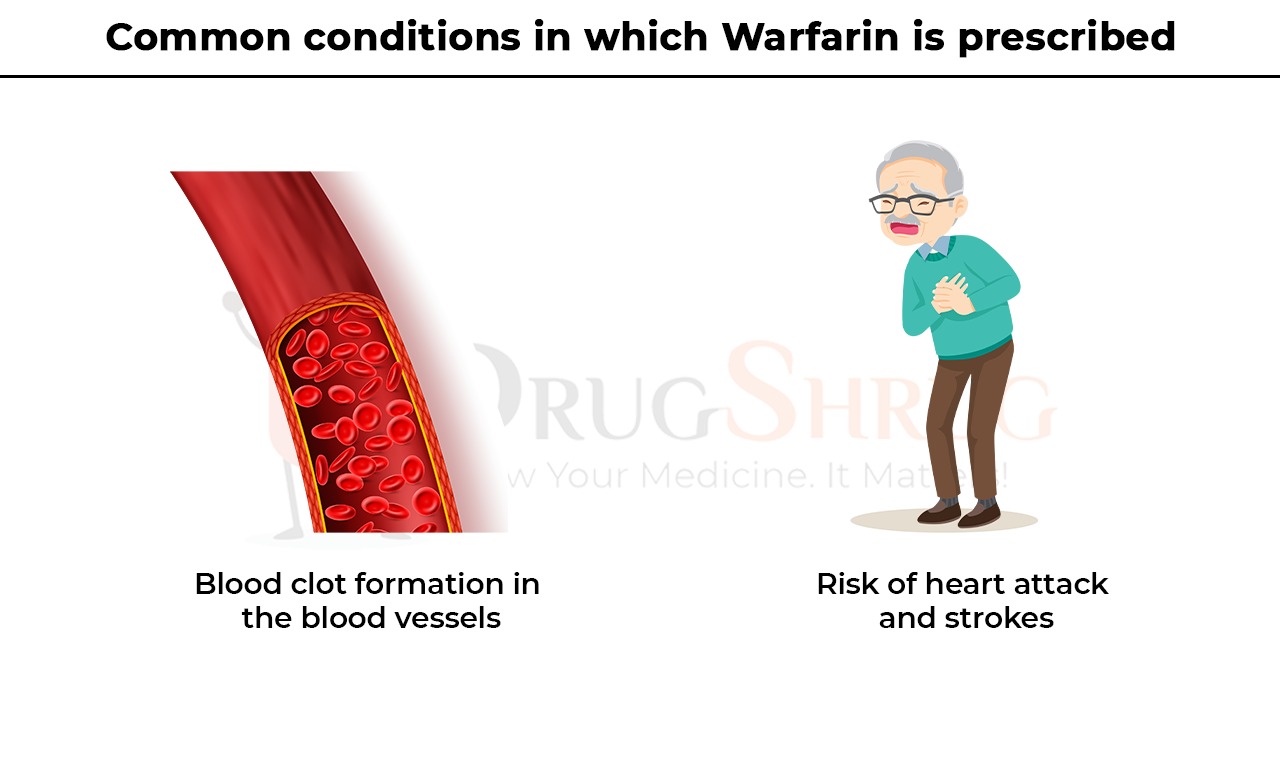
How should I take Warfarin?
Strictly follow the instructions on the prescription label and take it in the recommended amounts and for advised duration only. Your doctor may also alter your dosage frequently as per the requirements of the treatment. Be consistent in the timings of taking the medicine, either with or without meals, and avoid administering double doses. This drug can make you vulnerable to bleed unusually easily. If the bleeding remains incessant, get to your doctor urgently. You will have to undertake regular INR aka prothrombin time tests. This is done to reckon the blood clotting time and decide the warfarin dose. While using this drug, you need to be under the surveillance and care of your clinician.
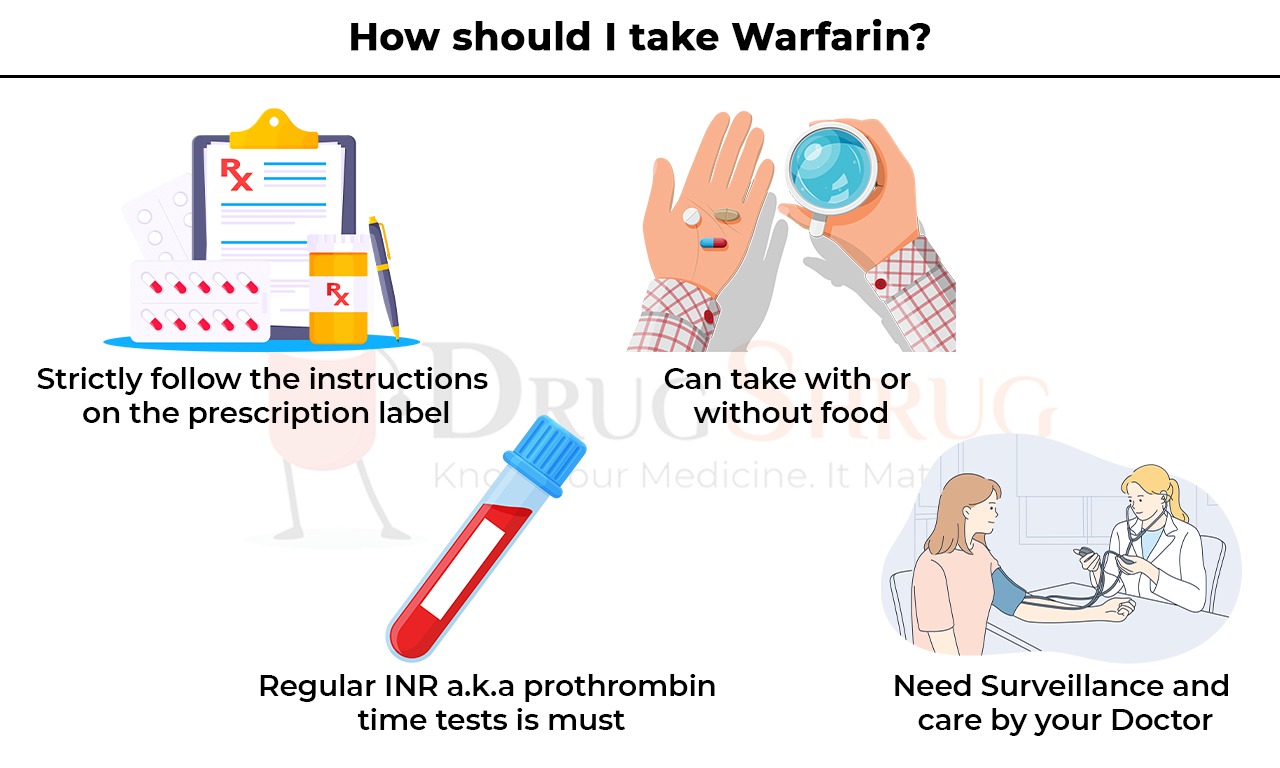
In case you are given this drug in hospital settings, meet your doctor after you are dispensed from the hospital. The doctor needs to check your INR and mind the follow-up appointments strictly. Inform your doctor if you face diarrheic, fever, chills, or symptoms of flu, body weight alterations. If you are to undergo any surgery, you may have to stop taking this medicine at least 5-7 days before the procedure. Ask your doctor for other instructions. Prefer to wear a medical alert label or have an ID card along with you mentioning the usage of warfarin drug. Your healthcare provider should be knowing about this.
You may need to stop taking warfarin 5-7 days before having any dental work, a medical procedure, or surgery. Call your doctor for instructions. Keep it at room temperature in a cool and dry place. Do not indulge in activities that can increase the risk of injury or bleeding. Be extra concerned about bleeding while brushing your teeth. Even if you discontinued using this drug, there persists the risk of bleeding for several days. Never attempt changes in your diet without communicating to your doctor. This is because some foods containing vitamin K (liver, leafy green vegetables, or vegetable oils) can reduce the efficacy of this medicine.
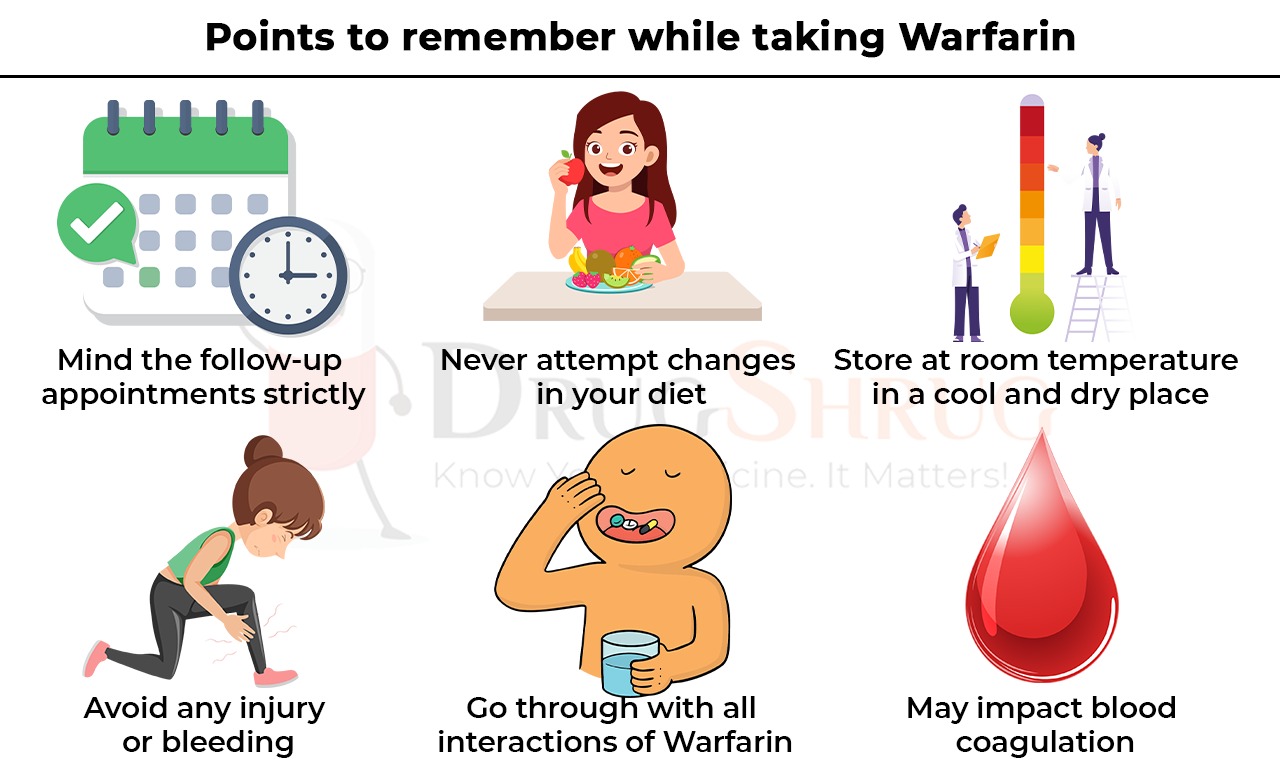
In case such foods are part of your staple diet, you may take them consistently on a weekly basis. Avoid alcohol consumption, grapefruit juice, noni juice, pomegranate juice and cranberry juice since these may interact with this drug which may trigger terrible responses.
Enquire to your doctor regarding the use of any medicine for pain, arthritis, swelling, or fever. This may consist of ibuprofen (Advil, Motrin), aspirin, naproxen (Aleve), celecoxib (Celebrex), diclofenac, indomethacin, meloxicam and other drugs. Some of these medicines may impact blood coagulation and also intensify the risk of stomach bleeding.
When you should not take Warfarin?
Do not use this medicine if you are vulnerable to bleeding problem owing to some medical condition, or about to undergo any medical surgery, or if you require an epidural or spinal tap. Avoid the drug if you cannot be consistent in your daily timings of taking this medicine. This medicine augments the risk of bleeding particularly if you suffer from any such medical condition, if you are 65 years old or above, if you have a history of stroke, or bleeding in intestines or stomach. If the bleeding does not stop, seek immediate medical assistance.
If you experience any other bleeding signs like: swelling, pain, feeling very weak or light-headed, unusual bruising, bleeding gums, nosebleeds, heavy menstrual periods or abnormal vaginal bleeding, blood in urine, bloody or black stools, coughing up blood or vomit that appears like coffee grounds. Several other medicines can heighten the risks of bleeding when taken in tandem with warfarin. So disclose all your medicines to the doctor. Do not attempt any changes in your diet, since some foods may reduce the efficacy of this medicine.
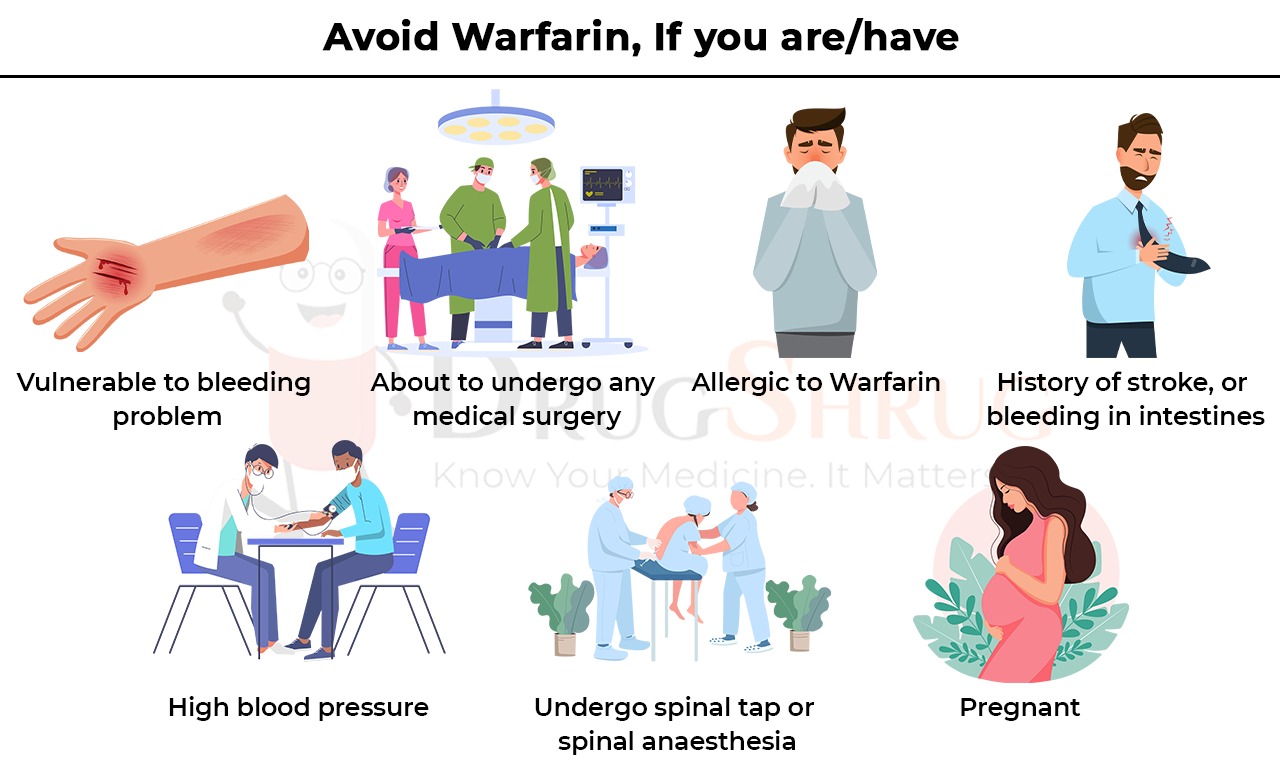
Avoid the drug if you are allergic to it or if you have the following:
You should not take warfarin if you are allergic to it, or if:
- you have extremely high blood pressure;
- if you recently had or will have surgical operation on your brain, spine, or eye;
- you undergo a spinal anesthesia (epidural) or spinal tap ; or
- you cannot take warfarin on time daily
Furthermore, do not take this medicine if you are vulnerable to bleeding due to medical conditions like:
- a blood cell disorder (such as low low platelets or RBCs);
- ulcers or bleeding in stomach, intestines, lungs, or urinary tract;
- bleeding in the brain or an aneurysm; or
- an infection of the coating of your heart
Avoid the medicine if you are pregnant unless your doctor recommends. Since this drug may inflict birth defects, in bay and preventing blood in the baby may compensate for the risks. In case you are not pregnant, utilize effective birth control measures while taking the medicine and for at least 1 month after your final dosage. If you get pregnant, inform the doctor.
Warfarin can make you prone to easy bleeding, particularly if you ever faced the following:
- high blood pressure or serious heart disease;
- kidney disease;
- cancer or low blood cell counts;
- an accident or surgery;
- bleeding in stomach or intestines;
- a stroke; or
- if you are 65 or older
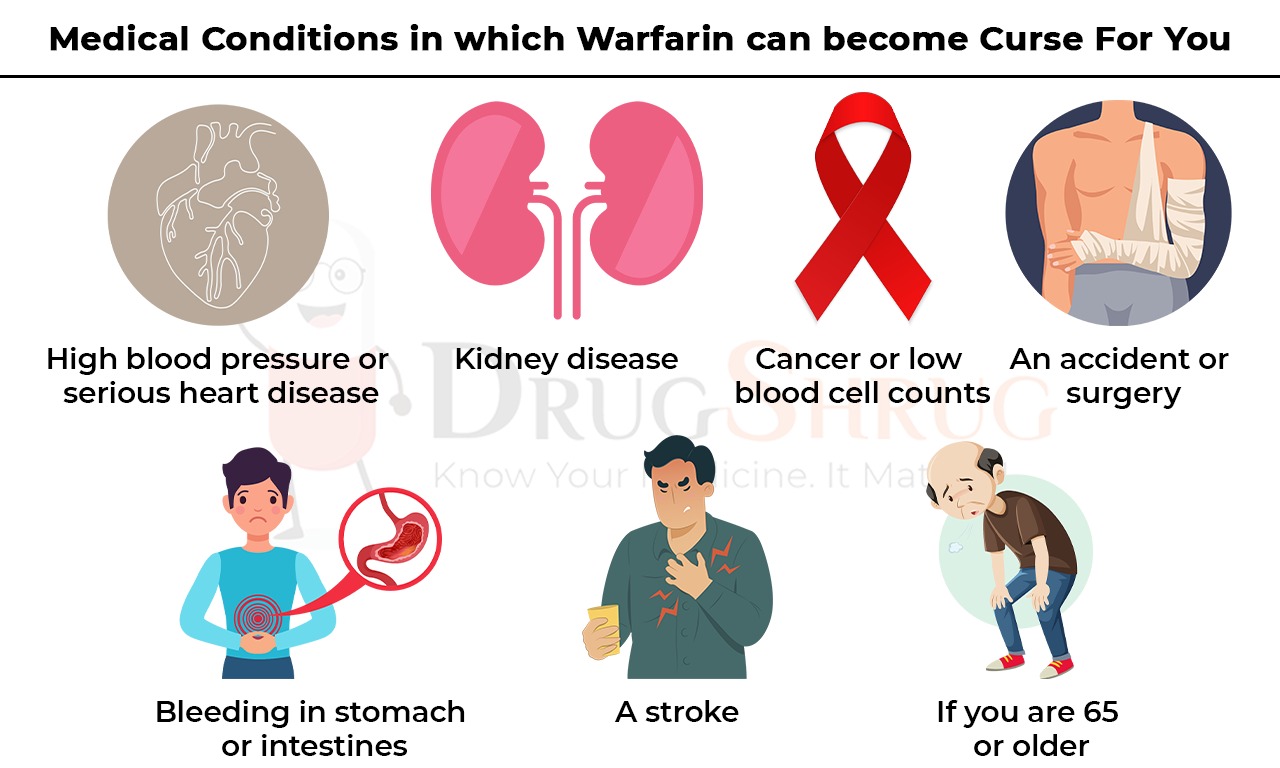
To ensure the safety of this drug for you, inform your doctor if you ever had:
- diabetes;
- congestive heart failure;
- kidney disease, liver disease (or if you are on dialysis);
- a hereditary clotting deficiency; or
- low blood platelets after getting heparin.
It is yet undiscovered if this medicine gets transported to breast milk. However, you need to notice for the symptoms of bruising or bleeding in your baby if you breastfeed while using this medicine.
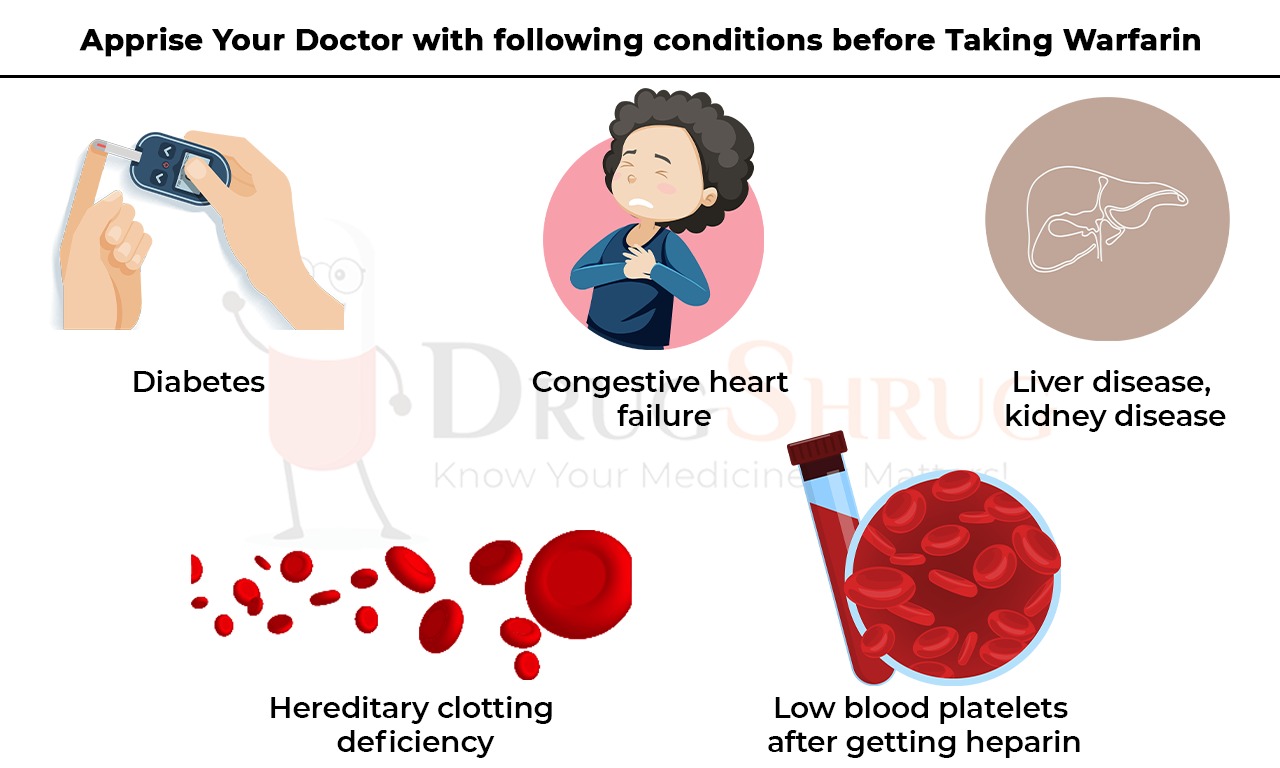
What are the possible side effects of Warfarin?
If you experience symptoms of allergic response to the medication such as hives, shallow breath, inflammation in your face or throat, seek immediate medical attention.
This medicine can heighten your risk of severe or mild bleeding. Tell your doctor right away if you feel:
- unexpected headache, feeling weak or light-headed;
- inflammation, pain, unusual bruising;
- bleeding gums, nosebleeds;
- bleeding from wounds or needle injections that will not cease;
- heavy menstrual periods or abnormal vaginal bleeding;
- blood in urine, tarry or bloody stools; or
- coughing up blood or vomit that appears like coffee grounds.
Clots generated by this medicine may restrict normal blood flow, that could further death or confiscation of the distressed body part.
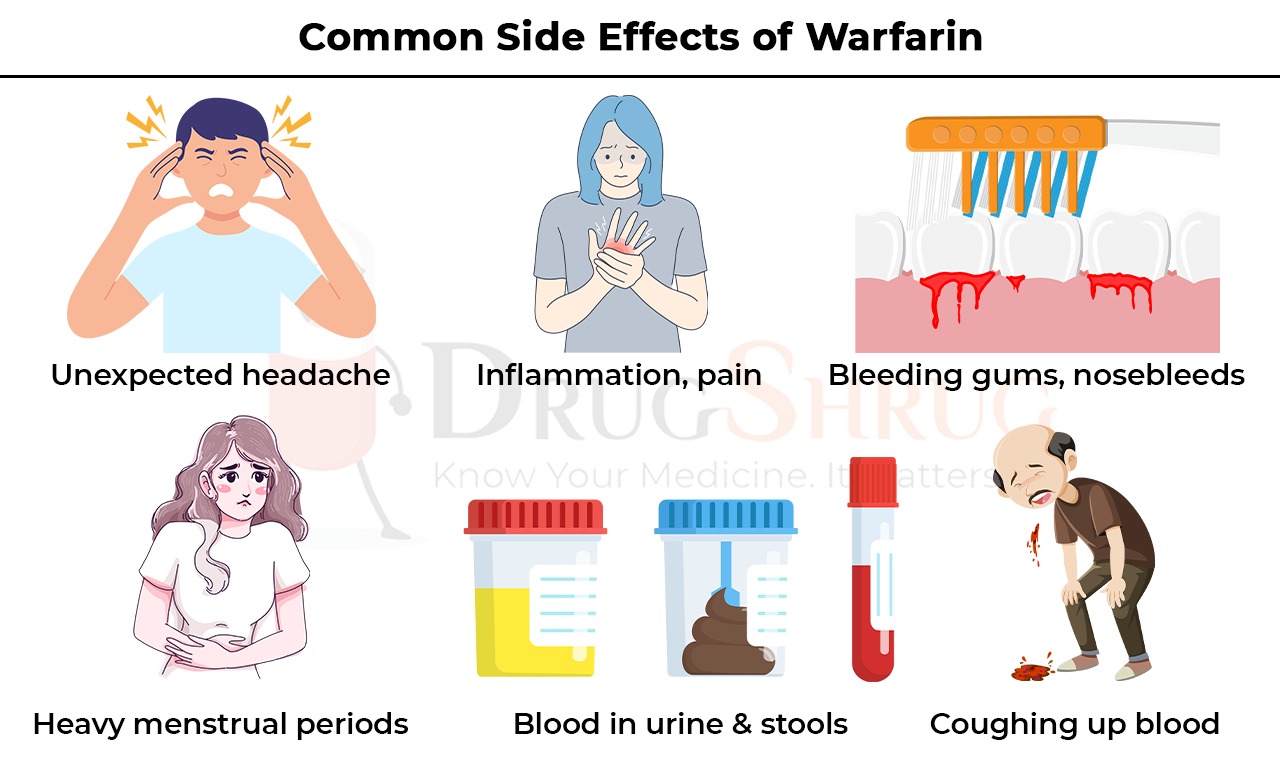
Seek medical assistance urgently if you notice any of the following:
- pain, inflammation, hot or cold sensations, skin changes, or discoloration at any place on your body; or
- abrupt and serious leg or foot pain, foot ulcer, purple toes or fingers.
Bleeding is a typical side effect of this drug. This is not a complete list of side effects, and others may occur. Call your doctor and tell about side effects so that he/she can give you medical advice.

What to do if I miss the dose?
However, if you administer the medicine daily and miss a dosage, then have it as soon as you remember. However, if it is almost the time of your next dose, skip the missed one. Avoid taking two doses at a time to compensate for the missed dosage.
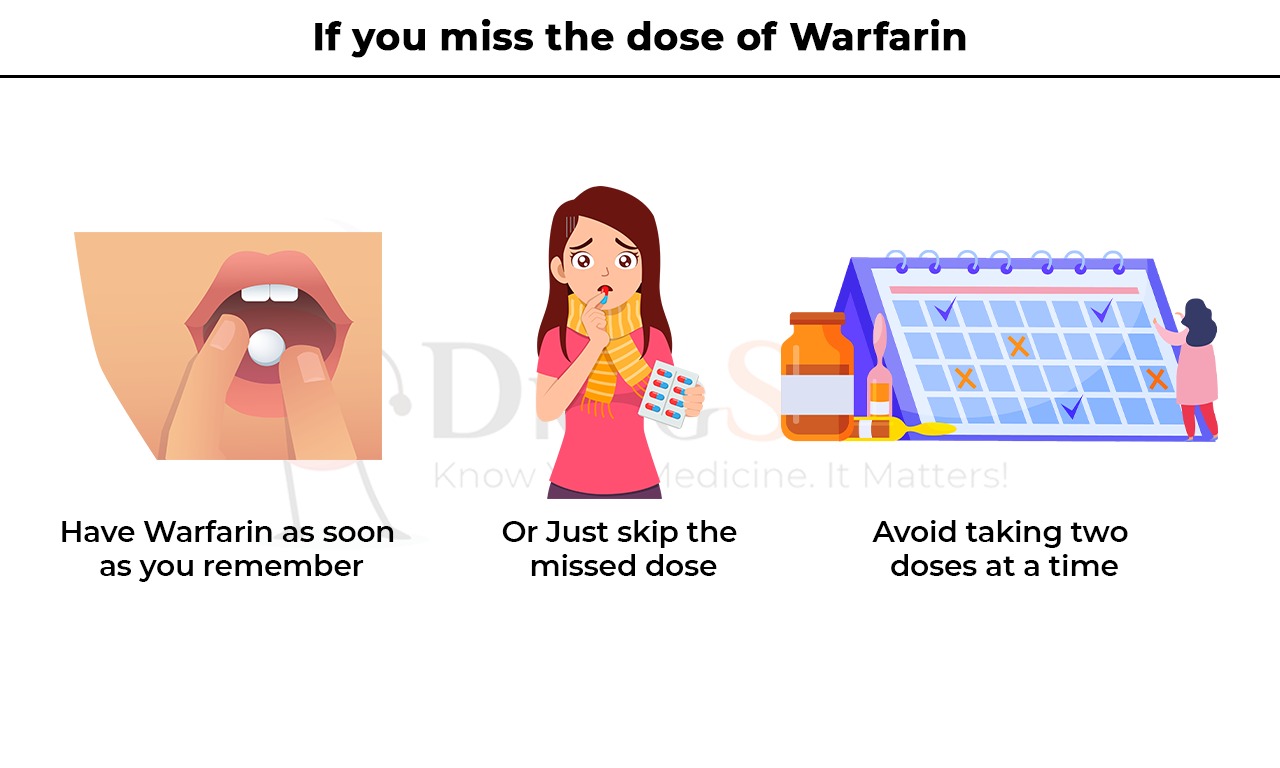
Common Drug Interaction with Warfarin
There are several drugs that may interact with warfarin (consisting of herbal products and over-the counter drugs) and may thus interfere with your INR. This consequently increases the dangers of bleeding if taken along with this medicine. This is not an exhaustive list of drug interactions, so it is recommended that you ask your doctor about the other risks.
Inform the healthcare provider about the medicines you recently started or stopped taking, specifically:
- other medicines to avoid blood clots;
- an antibiotic or antifungal medicine;
- supplements that contain vitamin K; or
- herbal products: coenzyme Q10, cranberry, echinacea, garlic, ginkgo biloba, ginseng, goldenseal, or St. John’s wort.
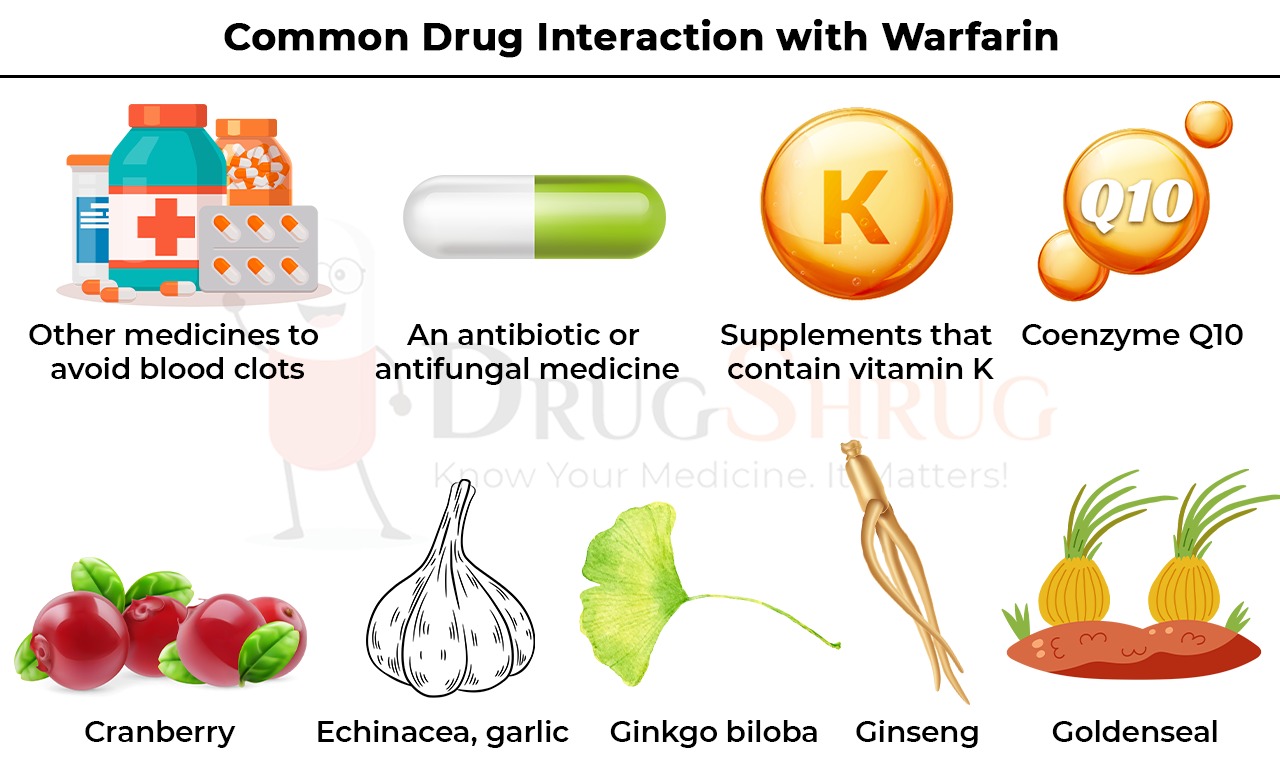
Bottom Line
Warfarin is an anticoagulant medicine used to treat and prevent blood clot formation. Therefore, it also helps in avoiding heart attacks, strokes and related medical conditions. Being a strict prescriptive medicine, it should not be taken without doctor’s consultation. Strictly follow all the instructions while using this drug else serious consequences may ensue.
Further Reading:
